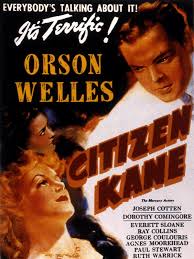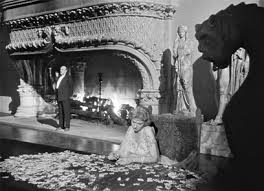Last week my number finally came up and the Monroe County Public Library let me know that it was my turn to borrow their one copy of the DVD of Citizen Kane. I picked it up using the drive-up window, which I have never done before (maybe I should have had that on my bucket list!). Turns out I should have called ahead in order to have it at the window instead of on the “holds” shelf, but you live and learn and the friendly librarian at the window went and got it for me anyway.
Citizen Kane regularly turns up at the very top or close to the top of “best movies of all time” lists, so I put it on my 60th Birthday Bucket list because I had never seen it. It is a long movie—1 hour and 59 minutes—and last week was a busy one for me and Bob, who wanted to watch it with me, so we had to get it done in two installments. After we saw the first half on Tuesday, I asked Bob what he thought so far, and his reaction was the same as mine: he wasn’t sure what the plot was.
The plot involves a rich, important man, Charles Foster Kane. He dies at the beginning of the movie with his last word being “rosebud,” and as a follow-up to his obituary, presented in the movie as a typical 1940s newsreel, a reporter attempts to find out what this word meant by interviewing various people in the rich man’s opulent and egotistical life. The reporter is thenceforth in the movie always seen from the back (as far as I remember) during a series of interviews, which lead to flashback scenes of Kane’s life. The flashback scenes do not relate to “rosebud” at all (except for one, but this is not known until the end of the movie), which is why the plot seems thin at the beginning of the movie.
Co-written, directed, and starred in by Orson Welles, the movie was made in 1940-41 with innovative cinematographic techniques, and its style took some getting used to. The Steadicam was still 30 years down the road then, and to our 21st-century eyes that are used to the moving shots and quick scene changes of mainstream movies and TV, the camera was very static and the action, if there was even any movement on the screen, was slow. In the interview scenes, the camera never moves from its focus or location as the interviewees speak, a strange type of shot for those of us used to watching Luke and Leia on their speeder bikes, but actually quite effective in Welles’ overall and, in the final analysis, striking and memorable concept.
For those who have not seen Citizen Kane, I won’t give away the ending and spoil the answer to what “rosebud” meant. I’ll just say the movie is a commentary on the truth that you can’t buy happiness, and I’ll also tell you that, according to the movie, if you as a kid ever said to your mom “you are ruining my life,” you were probably right.